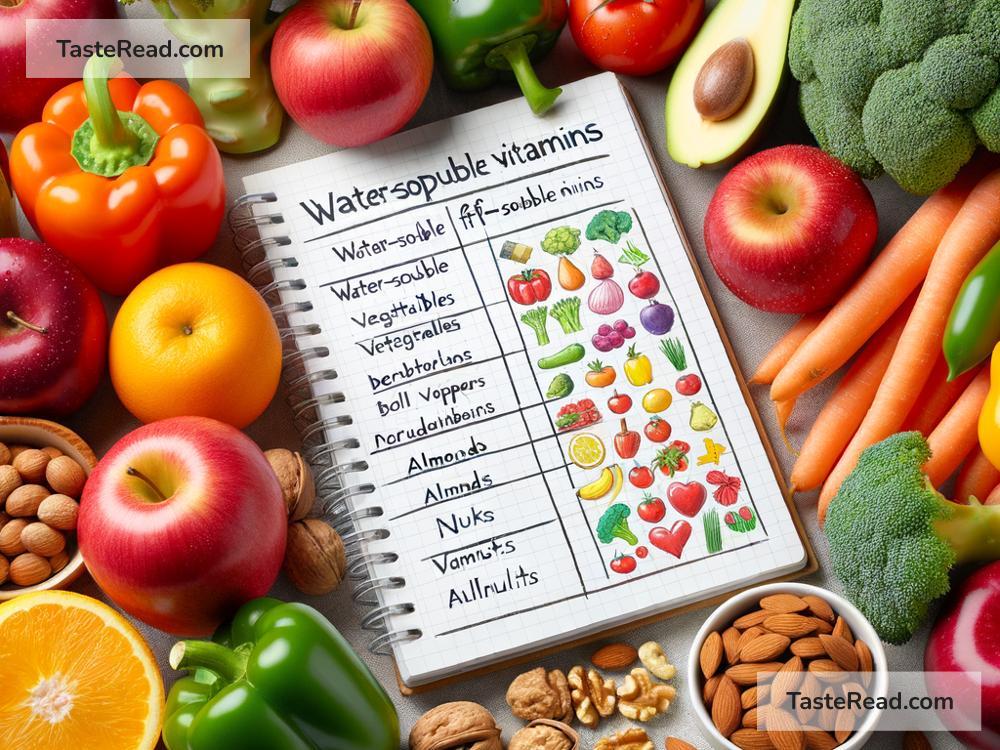Understanding the Role of Water-Soluble vs. Fat-Soluble Vitamins
Vitamins are an essential part of staying healthy and keeping our bodies functioning smoothly. These tiny nutrients act like helpful tools that keep everything running well inside us. But did you know that vitamins aren’t all the same? They can be divided into two big groups: water-soluble vitamins and fat-soluble vitamins. To stay healthy, it’s important to understand what they are, how they work, and where we can get them.
Let’s break things down in simple terms!
What Are Vitamins?
Vitamins are nutrients our bodies need to work properly. They don’t provide energy like carbs or fats do, but they play special roles that help us grow, repair cells, and fight off diseases. Since our bodies can’t make most vitamins on their own, we need to get them from food or supplements.
Water-Soluble Vitamins
Water-soluble vitamins dissolve in water. This means they move easily through our bloodstream, and our body uses what it needs, then flushes out the rest in urine. Because they aren’t stored in the body for long, we need to replenish them regularly by eating foods that contain these vitamins.
Some common water-soluble vitamins include:
– Vitamin C
– B vitamins (like B1, B2, B3, B6, B12, folate, and biotin)
What Do They Do?
Water-soluble vitamins play a vital role in keeping our cells, nervous system, and energy levels healthy. For example:
– Vitamin C boosts our immune system and helps maintain healthy skin, bones, and blood vessels.
– B vitamins help convert the food we eat into energy, produce red blood cells, and keep our brain functioning properly.
Where Can You Find Them?
You can find water-soluble vitamins in a variety of fresh foods like:
– Fruits: Oranges, strawberries, and kiwis are rich in Vitamin C.
– Vegetables: Spinach, broccoli, and bell peppers are good sources of Vitamin C and folate.
– Meat, fish, and eggs: These are great for B vitamins like B12 and B6.
– Whole grains: Brown rice and oats provide B vitamins like niacin and thiamine.
Because these vitamins dissolve in water, cooking methods like boiling can sometimes reduce their levels in food. Steaming or eating raw fruits and vegetables can help preserve more of their nutrients.
Fat-Soluble Vitamins
Fat-soluble vitamins dissolve in fat (not water), and the body can store them in fatty tissues and in the liver for later use. Since these vitamins stay in the body longer, you don’t need to eat them every day—though you still need to make sure your overall diet provides enough over time.
The main fat-soluble vitamins include:
– Vitamin A
– Vitamin D
– Vitamin E
– Vitamin K
What Do They Do?
Fat-soluble vitamins are crucial for specific functions in the body:
– Vitamin A is important for good eyesight, healthy skin, and a strong immune system.
– Vitamin D helps absorb calcium, which keeps your bones and teeth strong.
– Vitamin E acts as an antioxidant, protecting your cells from damage.
– Vitamin K plays a key role in clotting blood, so you stop bleeding when you get a cut.
Where Can You Find Them?
Fat-soluble vitamins are found in foods like:
– Vitamin A: Carrots, sweet potatoes, spinach, and liver.
– Vitamin D: Fatty fish, egg yolks, and fortified foods like milk or cereals. Your skin can also make Vitamin D when exposed to sunlight.
– Vitamin E: Nuts, seeds, and leafy greens like spinach.
– Vitamin K: Leafy greens (like kale and broccoli), and also eggs.
Since these vitamins dissolve in fat, they are best absorbed when eaten with foods that contain healthy fats, such as olive oil, fish, or avocado.
What Happens if You Don’t Get Enough Vitamins?
If you don’t get enough of certain vitamins, your body may struggle to function properly. For example:
– Lack of Vitamin C can lead to a disease called scurvy, which causes gum problems and fatigue.
– Low Vitamin D can make bones weak, leading to rickets or osteoporosis.
– Not enough Vitamin A can cause night blindness.
On the other hand, getting too much of fat-soluble vitamins (through supplements) can lead to problems because they build up in the body.
Key Differences Between Water- and Fat-Soluble Vitamins
To recap:
1. How they dissolve: Water-soluble vitamins dissolve in water, while fat-soluble vitamins dissolve in fat.
2. Storage: Fat-soluble vitamins can be stored in the body; water-soluble vitamins cannot.
3. Daily needs: Water-soluble vitamins need to be replenished more often because they leave the body quickly. Fat-soluble vitamins don’t need to be consumed daily since they’re stored for later use.
The Bottom Line
Eating a variety of foods—fruits, veggies, grains, proteins, and healthy fats—can help you get all the vitamins your body needs. Water-soluble vitamins keep your energy up and cells working well, while fat-soluble vitamins support long-term functions like bone health, immunity, and cell protection.
Since vitamins work together to help us stay healthy, balance is key! Instead of worrying about specific vitamins, focus on eating a colorful, well-rounded diet. Your body will thank you for it.
So the next time you enjoy a plate full of fresh fruits, veggies, lean proteins, and healthy fats, remember—you’re giving your body the tools it needs to feel strong and energized every day!


